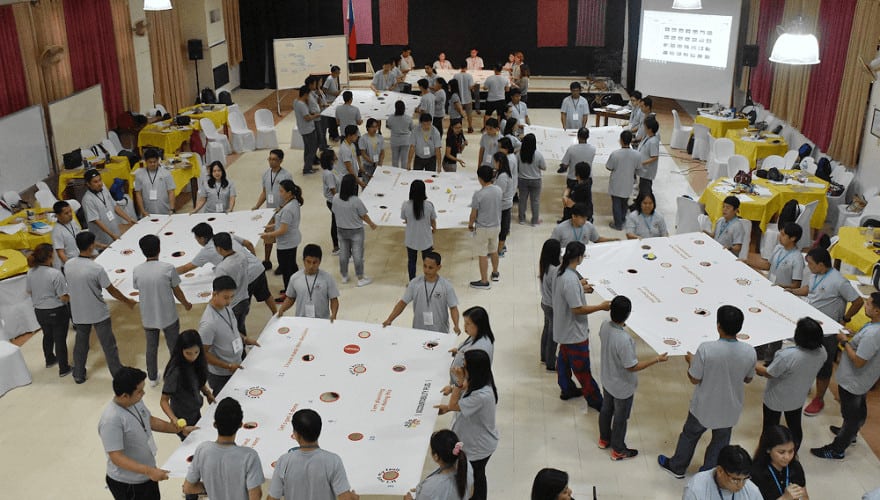Diskarte is Filipino street smarts, but when it turns into hustle culture, people start gaming rules, bending ethics, and calling it “madiskarte”—and the workplace pays the price. In this article, Jef Menguin shows how to keep diskarte as resilience and wit, not selfish advantage. Practice it and share it with your team so you build a culture that adapts fast without losing integrity.
Diskarte is a quintessential Filipino value that embodies resourcefulness, creativity, and the ability to make the best out of any situation. It is a value that is deeply ingrained in the Filipino psyche and manifests in various aspects of daily life.

What is diskarte?
Diskarte has no direct English translation, but it encompasses a range of traits such as resourcefulness, cleverness, and the ability to think on one’s feet. It is the ability to adapt to situations, make quick decisions, and find solutions to problems even with limited resources. Diskarte is a survival skill that is often developed through experience and necessity.
Importance of Diskarte
Filipinos believe that a person with diskarte won’t go hungry. They find ways. They make the most of the situation they are in.
They are like Harry Houdini who can think inside the box. Now, here are the reasons why we think having diskarte is important.
Problem Solving
In a country where resources can sometimes be scarce and challenges aplenty, Diskarte is a vital skill that helps Filipinos navigate through daily challenges.
Whether it is finding a way to get home during a transportation strike, or figuring out how to make ends meet with a tight budget, Diskarte comes into play.
Adaptability
Filipinos are known for their ability to adapt to different situations and environments. This adaptability is largely due to the value placed on Diskarte.
Whether it is adapting to a new job, a new country, or a new set of circumstances, Filipinos often find a way to make it work.
Innovation
Diskarte also involves creativity and innovation. It is about thinking outside the box and coming up with new and inventive solutions to problems.
This trait is particularly valuable in the workplace and is one of the reasons why Filipinos are sought-after employees worldwide.

Diskarte in Everyday Life
One doesn’t need to dive deep into historical archives or academic texts to understand diskarte. In fact, its manifestations are woven into the fabric of daily Filipino life. From the familiar hum of the Jeepney engine to the ringing bell of a local sari-sari store, the spirit of diskarte is alive and kicking. Here’s how:
The Jeepney: A Symbol of Adaptation
The history of the jeepney is a classic testament to Filipino diskarte. Originating from the surplus of military jeeps left by the U.S. after World War II, Filipinos transformed these vehicles into colorful, efficient public transport machines. Rather than discarding them or allowing them to rust, locals saw potential.
They extended the bodies, added vibrant decorations reflecting Filipino culture, personalities, and even humor. Routes were established, and over the years, the jeepney became an icon of the Philippines.
But the diskarte doesn’t stop there. Jeepney drivers, in the spirit of maximizing potential earnings, have been known to fit as many passengers as safely possible, find the quickest routes through the infamous Manila traffic, and even provide entertainment in the form of onboard radio or karaoke systems. The resilience of the jeepney industry, despite numerous challenges and calls for modernization, is a testament to the Filipinos’ ability to adapt, innovate, and thrive.
Sari-sari Stores: Micro-enterprises and Resourcefulness
Sari-sari stores, literally translating to “variety” stores, are omnipresent small retail outlets scattered across the country. They sell everything from candies to candles, offering a convenient spot for locals to purchase daily necessities without the need for a long trek to larger commercial establishments.
These humble stores are diskarte embodied. Many are started with minimal capital, often in front of the owner’s house or as an annex. The owners demonstrate incredible resourcefulness in inventory management, ensuring that they provide essentials without overstocking, and always seem to know exactly what the local community needs.
The sari-sari store also serves as a social hub, a place where locals gather for a chat, children buy their afternoon snacks, and neighbors catch up on the latest news. Some even offer credit systems for trusted patrons, exemplifying the community trust and mutual aid integral to the Filipino spirit.
Additionally, sari-sari stores are often a family affair. Children learn the ropes of entrepreneurship early on, assisting parents after school hours. This early exposure instills not just business skills but also the values of hard work, perseverance, and, of course, diskarte.
At Work
In the workplace, Diskarte might manifest as the ability to come up with innovative solutions to problems, or the ability to adapt to new challenges and tasks quickly. It might also involve finding ways to optimize processes or resources to get the job done more efficiently.
At Home
At home, Diskarte might involve finding ways to stretch the budget, or coming up with creative solutions to household problems. It could also involve finding ways to balance work, family, and personal time.
In the Community
In the community, Diskarte might involve finding ways to contribute and make a difference, even with limited resources. It could involve organizing a community event, helping a neighbor in need, or finding ways to support local businesses.
No posts
Examples of Diskarte
Here are two stories that demonstrate the benefits of Diskarte.
Anna
Anna is a single mother of three who works full-time to support her family. One day, her youngest child fell ill and needed to be taken to the hospital. Anna couldn’t afford to take a day off work, so she had to find a way to balance her responsibilities at work and at home.
Using her diskarte, Anna arranged with her employer to work from home for the day, while also arranging for a neighbor to check on her child periodically.
Anna was able to fulfill her responsibilities at work, while also taking care of her child.
Mark
Mark is a small business owner who was struggling to keep his business afloat during the pandemic. With restrictions on movement and a decline in customers, Mark had to find a way to keep his business running.
Using his diskarte, Mark quickly pivoted his business to offer home delivery and online ordering. He also started offering meal kits and DIY kits for customers to prepare at home. These changes helped Mark to keep his business running and even attract new customers.
Similarities with Other Cultures
The concept of diskarte bears similarity to the concept of ‘jugaad‘ in Indian culture. Both concepts revolve around resourcefulness and the ability to find cost-effective solutions in difficult situations. Similarly, the concept of ‘MacGyverism‘ in Western culture involves using creativity and resourcefulness to solve problems with available materials.
Differences from Other Cultures
While the concepts mentioned above are similar to diskarte, the application and nuances can vary significantly across cultures. For example, ‘jugaad’ sometimes has a negative connotation in India as it may involve cutting corners or bypassing rules.
In contrast, Diskarte is generally seen as a positive trait in the Philippines, although it also involves a degree of resourcefulness that may sometimes bend the rules.
The Psychology Behind Diskarte
The spirit of diskarte finds parallels in psychological principles that underscore human adaptability, resourcefulness, and the power of a flexible mindset. By delving into its psychological underpinnings, we can better appreciate its universality and relevance.
Adapting in the Face of Adversity
The essence of diskarte lies in facing adversity head-on and adapting accordingly. Psychologically, this can be understood through the lens of resilience. Resilience refers to an individual’s capacity to withstand and bounce back from adversities, be it economic challenges, personal tragedies, or societal upheavals.
One critical element of resilience—and of diskarte—is effective problem-solving. When faced with an obstacle, individuals with high resilience don’t get paralyzed; instead, they find ways to navigate around or overcome the problem.
Another vital component is the ability to regulate emotions in difficult times. Instead of succumbing to panic or despair, individuals practicing diskarte maintain a balanced emotional state, allowing for clear-headed decisions.
Resilient individuals learn from past challenges. This means drawing from past experiences, successes, or failures, and using them as references for current challenges.
The Power of a Flexible Mindset
At the heart of diskarte lies cognitive flexibility, which is the ability to shift our thinking and adapt our behavior according to the situation at hand. This flexibility is vital in a world that’s constantly changing.
A flexible mindset means being open to new ideas and solutions. Instead of being stuck in a singular way of thinking, you explore various angles to a problem, even if they seem unconventional.
Those with a flexible mindset are adept at recognizing when a particular approach isn’t working and can swiftly pivot to a different strategy. This adaptability is seen in the Filipino’s knack for innovation in everyday situations.
Diskarte often requires making decisions with incomplete information. Having a flexible mindset means being comfortable with ambiguity and uncertainty, trusting in one’s capacity to handle the outcome.
The concept of a growth mindset—the belief that abilities and intelligence can be developed through dedication and hard work—complements the principles of diskarte. It’s about seeing challenges as opportunities for growth rather than insurmountable obstacles.
While diskarte may be a term unique to Filipino culture, the psychological foundations supporting it are universal. Recognizing and understanding these principles not only celebrates the wisdom and resourcefulness of the Filipino spirit but also paves the way for integrating diskarte’s values into broader global contexts.

Leadership Training in the Philippines

Supervisory Training Programs

Impromptu Speech Genius

Team Leadership: Essential Skills for Leading High-Performing Teams
Challenges
One of the challenges of practicing diskarte is navigating the ethical dilemmas that may arise. Because Diskarte sometimes involves bending the rules or finding loopholes, it can sometimes lead to morally ambiguous situations.
It is important to balance resourcefulness with ethical considerations.
Another challenge of diskarte is the tendency to rely on short-term solutions. While this can be beneficial in emergency situations, it may not always lead to the most sustainable or effective long-term solutions. It is important to balance the need for immediate action with consideration for the long-term implications.
Mastering the Art of Diskarte
Diskarte is more than just a cultural concept; it’s an actionable toolkit. Like any art, it requires practice, refinement, and understanding of its fundamental principles.
By distilling it into stages, we can better comprehend its mechanics and integrate it into our lives, regardless of cultural background.
Observation: The First Step in Diskarte
Before you can strategize, you must understand the lay of the land.
Diskarte starts with being aware of one’s surroundings, the available resources, potential obstacles, and possible allies. By keenly observing, one can identify opportunities and challenges that others might overlook.
Beyond the external, it also calls for introspection. Recognizing your emotions, strengths, and limitations is crucial. It’s equally important to gauge the emotions of those around you to predict how they might react or how best to collaborate with them.
Repeated observation allows for recognizing patterns – in behaviors, in outcomes, in challenges. This skill enables anticipation, a crucial element in proactive diskarte.
Decision-making: Choosing the Best Path Forward
Once armed with insights from observation, the next step is to chart a course of action.
Every decision has consequences. Diskarte involves evaluating potential risks against potential rewards. Sometimes, the best path forward isn’t the most straightforward one.
It is inherently creative. It’s about thinking outside the box, sometimes merging seemingly unrelated concepts or resources to forge a new solution.
Not all actions yield the same results. It requires discerning which tasks or decisions are most pressing and which can be deferred, ensuring the best use of time and resources.
Implementation: From Thought to Action
All the strategizing in the world is of little use without execution.
While having a plan is essential, diskarte demands adaptability. As new information or challenges arise, one must be ready to adjust the course of action accordingly.
It shines in making the most out of what’s at hand. This means utilizing available resources—be it people, tools, or time—to their utmost potential.
After execution, it’s crucial to evaluate outcomes. Were the goals achieved? What unforeseen challenges arose? What could be done differently next time? This feedback informs future observation and decision-making, refining the art of diskarte with each iteration.
Embrace a dynamic, proactive approach to life, where challenges are viewed not as setbacks but as puzzles awaiting solutions.
Conclusion
Diskarte is a valuable Filipino trait that involves resourcefulness, adaptability, and creativity. It is a skill that is honed through experience and is essential for navigating the challenges of daily life. While there are challenges in practicing diskarte, it is important to balance resourcefulness with ethical considerations and long-term planning.
As a teacher with experience in values formation, I believe that nurturing the value of diskarte in the younger generation is crucial for their personal development and success in life. By fostering a mindset of resourcefulness, adaptability, and creative problem-solving, we can empower the next generation to overcome challenges and make a positive impact on the world.
References
Doronila, M. L. (1996). The Pinoy as Artisan and Artist. The Manila Times.
Reyes, A. (2001). Diskarte: Reflections on the Dynamics of Power. Philippine Sociological Review, 49, 19-36.
If you want Filipino values to show up as real behavior at work…
Let’s turn it into a culture shift experience.
→ Shift Experiences



